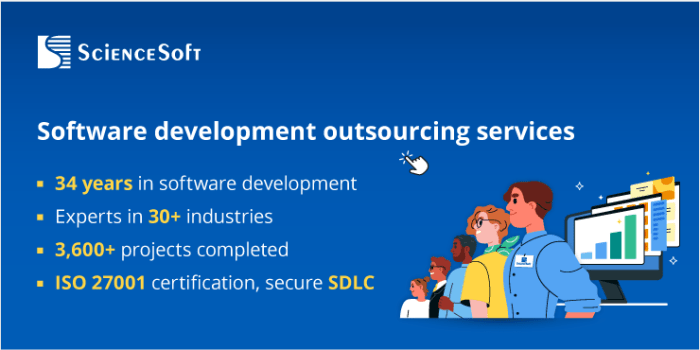In today’s dynamic business landscape, software has become an indispensable asset. Developing high-quality software, however, can be a complex and resource-intensive undertaking. This is where outsourced software development services come into play, offering businesses a cost-effective and efficient way to build, maintain, and scale their software applications. This comprehensive guide delves into the intricacies of outsourced software development, exploring its benefits, challenges, and best practices.
Understanding Outsourced Software Development
Outsourcing software development involves contracting a third-party company or individual to handle all or part of your software development project. This can encompass various aspects, from designing and coding to testing and deployment. Businesses choose to outsource for a variety of reasons, ranging from accessing specialized skills to reducing operational costs. The outsourcing model can take several forms, including:
Types of Software Development Outsourcing Models
- Nearshoring: Outsourcing to a company in a geographically close country, often sharing similar time zones and cultural contexts.
- Offshoring: Outsourcing to a company in a geographically distant country, often resulting in significant cost savings but potentially increasing communication challenges.
- Onshoring: Outsourcing to a company within the same country, offering convenience and ease of communication but potentially higher costs.
- Dedicated Teams: A dedicated team of developers is assembled specifically for your project, working exclusively on your needs.
- Project-Based Outsourcing: A specific project is outsourced with defined deliverables and timelines.
Benefits of Outsourcing Software Development
Outsourcing offers numerous advantages, making it an attractive option for many businesses. These benefits include:
Cost Savings
One of the primary drivers for outsourcing is cost reduction. Businesses can significantly lower their development costs by leveraging lower labor rates in other countries or by avoiding the overhead associated with building and maintaining an in-house development team. This includes savings on salaries, benefits, office space, and equipment.
Access to Specialized Skills
Finding and retaining skilled developers can be challenging. Outsourcing provides access to a global talent pool, allowing businesses to tap into specialized expertise in areas like artificial intelligence (AI), machine learning (ML), blockchain development, and more. This access to niche skills can be crucial for developing cutting-edge software solutions.
Increased Efficiency and Productivity
Outsourcing can free up internal resources, allowing your in-house team to focus on core business functions. This can lead to increased efficiency and productivity across the organization. The outsourced team handles the software development, allowing your internal team to concentrate on strategic initiatives and business growth.
Faster Time-to-Market
Outsourcing can accelerate the software development lifecycle. By leveraging a dedicated team with experience in agile methodologies, businesses can significantly reduce development time and bring their products or services to market faster. This speed advantage can be crucial in competitive markets.
Outsourcing software development offers businesses significant cost and time advantages. A popular approach involves leveraging the expertise of offshore custom software development teams, which often specialize in specific technologies. This strategy allows companies to focus on core competencies while benefiting from a skilled, external workforce, ultimately enhancing project efficiency and delivering high-quality software solutions.
Scalability and Flexibility
Outsourcing offers scalability and flexibility. Businesses can easily scale their development efforts up or down depending on their project needs. This adaptability is especially beneficial for startups and businesses experiencing rapid growth.

Challenges of Outsourcing Software Development
While outsourcing offers many advantages, it’s essential to acknowledge the potential challenges:
Communication Barriers
Communication difficulties can arise due to geographical distance, language differences, and cultural nuances. Clear communication protocols and regular interaction are crucial to mitigate these challenges. Utilizing project management tools and establishing clear communication channels are vital for successful outsourcing.
Quality Control
Maintaining quality control can be challenging when working with a remote team. Robust testing procedures, clear specifications, and regular progress reviews are essential to ensure the quality of the delivered software. Choosing a reputable outsourcing partner with a proven track record is crucial.
Security Concerns
Sharing sensitive data with an external team raises security concerns. Selecting a partner with robust security protocols and adhering to strict data protection measures are paramount. Understanding data privacy regulations (like GDPR) is also essential.

Intellectual Property Protection
Protecting intellectual property (IP) is a major concern. Clearly defined contracts with strong IP clauses are crucial to safeguard your company’s assets. This includes specifying ownership rights and non-disclosure agreements (NDAs).

Choosing the Right Outsourcing Partner
Selecting the right outsourcing partner is critical for project success. Consider the following factors:
- Experience and Expertise: Look for a partner with a proven track record in your specific industry and technology stack.
- Communication and Collaboration: Assess their communication skills and ability to work collaboratively.
- Portfolio and References: Review their past projects and seek references from previous clients.
- Security and Data Protection: Verify their security measures and compliance with relevant regulations.
- Pricing and Contract Terms: Carefully review the pricing model and contract terms to ensure transparency and fairness.
Best Practices for Successful Outsourcing
To maximize the benefits of outsourcing, follow these best practices:
- Clearly Define Requirements: Develop comprehensive project specifications and documentation.
- Establish Clear Communication Channels: Utilize project management tools and regular communication meetings.
- Implement Robust Quality Control Processes: Conduct thorough testing and code reviews.
- Monitor Progress Regularly: Track progress against milestones and address issues promptly.
- Build a Strong Relationship with Your Partner: Foster open communication and collaboration.
Frequently Asked Questions (FAQ)
- Q: How much does outsourced software development cost? A: The cost varies significantly depending on factors such as project complexity, team size, location, and technology used. It’s best to get customized quotes from potential outsourcing partners.
- Q: How do I choose the right outsourcing model? A: The best model depends on your specific needs and budget. Consider factors such as project size, complexity, required expertise, and your budget.
- Q: What are the risks associated with outsourcing? A: Potential risks include communication barriers, quality control issues, security concerns, and intellectual property protection challenges.
- Q: How can I ensure the quality of the outsourced software? A: Implement robust quality control processes, including thorough testing, code reviews, and regular progress monitoring.
- Q: How do I manage communication with an outsourced team? A: Utilize project management tools, establish clear communication protocols, and schedule regular meetings.
Conclusion
Outsourcing software development can be a highly effective strategy for businesses seeking to reduce costs, access specialized skills, and accelerate their time-to-market. By carefully selecting a reputable outsourcing partner, establishing clear communication channels, and implementing robust quality control processes, businesses can reap the numerous benefits of outsourcing while mitigating potential risks. Remember that thorough planning and a well-defined strategy are crucial for success.
References
- Gartner (for market research and insights)
- Forbes (for business and technology news)
- CIO (for IT leadership insights)
Call to Action
Ready to explore the potential of outsourced software development for your business? Contact us today for a free consultation and let us help you find the perfect outsourcing partner to bring your software vision to life!
